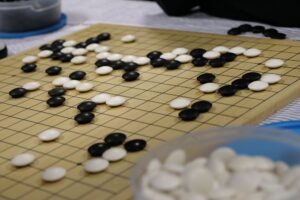
Remember AlphaGo, the AI that wiped the floor with pro Go players before it retired back in 2017? It’s arguably one of the more impressive forms of AI that paved the way for more research in the field. There have been a fair number of other AI made to play GO since, but recently, it looks like humans are finally getting leg up once again. The only problem is that this turning of the metaphorical tables is thanks to yet another AI.
The Financial Times reports that American amateur Go player Kellin Pelrine has managed to defeat two Go-playing AI. One is known as KataGo, while the other goes by the name of Leela Zero. For the match against the former, it’s quite the convincing victory too, at 14 wins out of 15 games.

Though as mentioned, the strategy used by Pelrine was one that was discovered by FAR AI. And it’s one that Pelrine describes as “not completely trivial but it’s not super-difficult”. The strategy itself involves stringing together a large loop of stones to encircle the enemy’s groups, while also distracting the AI with moves in other areas of the board. It’s something that a human player could spot quite easily, but it’s inexplicably a blind spot for Go-playing AIs.
As for FAR AI and its discovery of this weakness, this is done by playing a million games against KataGo. Just as AIs learn to play Go by playing and analysing countless of games to “learn” what works and what doesn’t, FAR AI does the same to discover said blind spots.

This shows that AI systems, despite their impressive potential, are still limited by their training, and are not capable of “thinking” as we do just yet. But at the same time, this shows that, at least in games of Go, having two AIs working together can help cover for each other’s weaknesses. For what it’s worth, KataGo developer Lightvector is already working to plug this hole in its AI’s gameplay. It’s also one that’s apparently been exploited for several months.
(Source: FT, lightvector / Github)
The post Humans Turn The Go Tables On AI, But With The Help Of Another AI appeared first on Lowyat.NET.